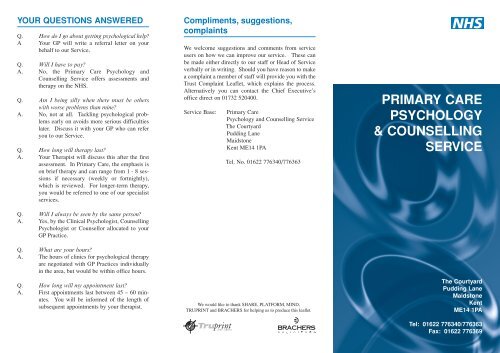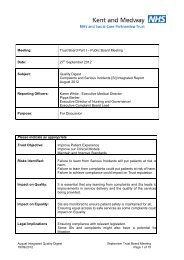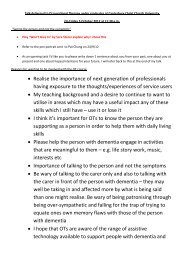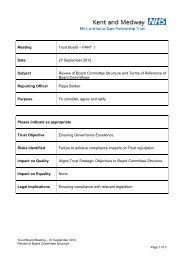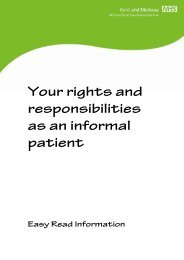primary care psychology & counselling service - Kent and Medway ...
primary care psychology & counselling service - Kent and Medway ...
primary care psychology & counselling service - Kent and Medway ...
Create successful ePaper yourself
Turn your PDF publications into a flip-book with our unique Google optimized e-Paper software.
YOUR QUESTIONS ANSWEREDQ. How do I go about getting psychological help?A Your GP will write a referral letter on yourbehalf to our Service.Q. Will I have to pay?A. No, the Primary Care Psychology <strong>and</strong>Counselling Service offers assessments <strong>and</strong>therapy on the NHS.Q. Am I being silly when there must be otherswith worse problems than mine?A. No, not at all. Tackling psychological problemsearly on avoids more serious difficultieslater. Discuss it with your GP who can referyou to our Service.Q. How long will therapy last?A. Your Therapist will discuss this after the firstassessment. In Primary Care, the emphasis ison brief therapy <strong>and</strong> can range from 1 - 8 sessionsif necessary (weekly or fortnightly),which is reviewed. For longer-term therapy,you would be referred to one of our specialist<strong>service</strong>s.Q. Will I always be seen by the same person?A. Yes, by the Clinical Psychologist, CounsellingPsychologist or Counsellor allocated to yourGP Practice.Compliments, suggestions,complaintsWe welcome suggestions <strong>and</strong> comments from <strong>service</strong>users on how we can improve our <strong>service</strong>. These canbe made either directly to our staff or Head of Serviceverbally or in writing. Should you have reason to makea complaint a member of staff will provide you with theTrust Complaint Leaflet, which explains the process.Alternatively you can contact the Chief Executive’soffice direct on 01732 520400.Service Base:Primary CarePsychology <strong>and</strong> Counselling ServiceThe CourtyardPudding LaneMaidstone<strong>Kent</strong> ME14 1PATel. No. 01622 776340/776363PRIMARY CAREPSYCHOLOGY& COUNSELLINGSERVICEQ. What are your hours?A. The hours of clinics for psychological therapyare negotiated with GP Practices individuallyin the area, but would be within office hours.Q. How long will my appointment last?A. First appointments last between 45 – 60 minutes.You will be informed of the length ofsubsequent appointments by your therapist.The CourtyardPudding LaneMaidstone<strong>Kent</strong>ME14 1PATel: 01622 776340/776363Fax: 01622 776369
WHAT IS THE PRIMARY CARE PSYCHOLOGY& COUNSELLING SERVICE?It is a team of professionals, highly trained <strong>and</strong> experienced inworking in GP Practices using brief, time-limited therapywith a specific problem focus for psychological treatment.The team includes Clinical <strong>and</strong> Counselling Psychologists<strong>and</strong> Counsellors.PSYCHOLOGICAL PROBLEMS/DIFFICULTIESPsychological problems are very common. Just because youare experiencing these feelings does not mean that you are“going mad”, which many people fear. Anybody can havedifficulties, whether they are old, young, rich, poor, male orfemale. These difficulties can appear to come “out of theblue” (although there always are reasons for this). These difficultiescan be brought on, particularly by stressful situations,e.g. bereavement, unemployment or the ending of a close relationship.Feelings of hopelessness, despair <strong>and</strong> being unableto cope happen more often than many people imagine.WHAT CAN BE DONE TO HELP?Although friends <strong>and</strong> relatives can be a great source of help <strong>and</strong>support, there are times when outside professional help is moreappropriate. Psychology is not just “common sense”, but a particularapproach to underst<strong>and</strong>ing <strong>and</strong> changing difficulties.EXAMPLES OF PROBLEMS WHICH CAN BEADDRESSEDAnxiety, Depression<strong>and</strong> StressEducational orOccupational DifficultiesInterpersonalRelationshipsAdjustment to PhysicalIllness <strong>and</strong> other life eventsGeneralised anxiety,reactive depression, panicattacks, phobias, obsessionalideas, psychosomatic orstress related illness, e.g.migraine, asthma.Study problems, lack ofconfidence <strong>and</strong> social skills,transition points in life e.g.relocating, change of job,retirementMarital discord,psychosexual difficulties, lackof assertion <strong>and</strong> lack ofself-esteem.(Personality Disorders are dealtwith elsewhere in the Trust.)e.g. chronic disabilitychildbirth, accident, terminalillness, bereavementWHAT TYPE OF HELP CAN I EXPECT?The <strong>service</strong> offers brief therapy for general psychological difficulties.We do not offer specialised long-term therapy whichcan be obtained elsewhere in Adult Mental Health SpecialistServices if necessary.WHAT IS EXPECTED OF ME?Clients who show commitment, attend regularly <strong>and</strong> practisewhat they have learned in-between sessions obtain the bestresults. If you are unable to attend any scheduled appointments,adequate notice is required to allow the session to beoffered to another client.HOW DO I KNOW WHETHER A PSYCHOLOGI-CAL CONSULTATION IS RIGHT FOR ME?It may be that you have already thought a lot about your difficulties,talked them over with other people <strong>and</strong> tried ways of helpingyourself. This, in itself, will have been an important step forward<strong>and</strong> it is possible that having a psychological consultationat this stage would be unnecessary or premature. However, ifyou are uncertain about the seriousness of your difficulties or, ifyou feel that things have already become stuck or reached a crisis-point,despite all your efforts, then a psychological consultationmay well be appropriate for you. It is worth rememberingthat the extent to which you benefit from such a consultation willalways depend on how ready you feel to make the effort toexplore your difficulties in an open-minded way <strong>and</strong> tolerate themore unpleasant feelings that this can bring about.WHAT WILL HAPPEN WHEN I FIRST CONSULTA THERAPIST?At your first meeting with your Therapist, you will be given theopportunity to talk <strong>and</strong> think about your difficulties so as tobuild up as clear as possible a picture of them. This may takemore than one meeting. On the other h<strong>and</strong>, sometimes onemeeting may be all that is needed to settle your mind about aproblem. The central purpose of the first meeting(s) is for you<strong>and</strong> your Therapist to decide whether you need, <strong>and</strong> couldmake use of, the kind of help that a Therapist has to offer.Where it is decided that you do need further help beyond theinitial consultation, then the Therapist will have to think aboutwhether he/she is the best person to offer that help. This is notalways the case for a variety of reasons. It may be that yourneeds may be more appropriately met by one of a variety ofother helping agencies available in the local community or inneighbouring regions (for example, CRUSE if you are recentlybereaved). Whatever your own situation, you can be sure thatyour therapist will be trying to help you come up with theoption that will best suit your needs.WHAT HAPPENS ONCE I DECIDE TO TAKE UPAN OFFER OF PSYCHOLOGICAL HELP?Where you <strong>and</strong> your Therapist agree that he or she is the bestperson to help you, a specific agreement will then be madebetween you about what sort of work will be undertaken, howfrequently <strong>and</strong> for how long. The nature of this “contract”will depend entirely upon your individual needs <strong>and</strong> howthese fit with the kinds of therapy your Therapist prefers to do(no two Therapists are exactly alike either).There are several different kinds of therapy, but they all havein common the fact that a working relationship is formedbetween you <strong>and</strong> your Therapist over a period of time, toexplore, underst<strong>and</strong> <strong>and</strong> tackle the obstacles that are makinglife difficult for you.THERAPEUTIC AGREEMENT1. Your therapist will give you a brief description of thetype of therapy/<strong>counselling</strong> they think would be usefulfor you <strong>and</strong> the aim <strong>and</strong> goals of the therapy or <strong>counselling</strong>for your specific situation.2. The therapist/counsellor will also discuss with you thepotential number of sessions they think might be usefulfor you <strong>and</strong> the length <strong>and</strong> frequency of the sessions.3. Attendance at sessions is very important for you to getbenefit from the therapy/<strong>counselling</strong>. If you cannotattend a session or need to cancel, please inform yourtherapist as soon as possible. It is also important that youarrive at your appointment on time so that you will havethe use of the full time for your session.4. Your therapist will also discuss with you anythingwhich might be useful for you to do in between sessions,such as reading self-help books, writing downyour thoughts or paying attention to specific situationsfor yourself. One of the purposes <strong>and</strong> benefits of therapy<strong>and</strong> <strong>counselling</strong> is the developing of personal awareness,so that you know how things become difficult foryou <strong>and</strong> how you can improve them.5. Your therapist will also discuss confidentiality <strong>and</strong> thelimits of confidentiality with you <strong>and</strong> the keeping ofnotes.


